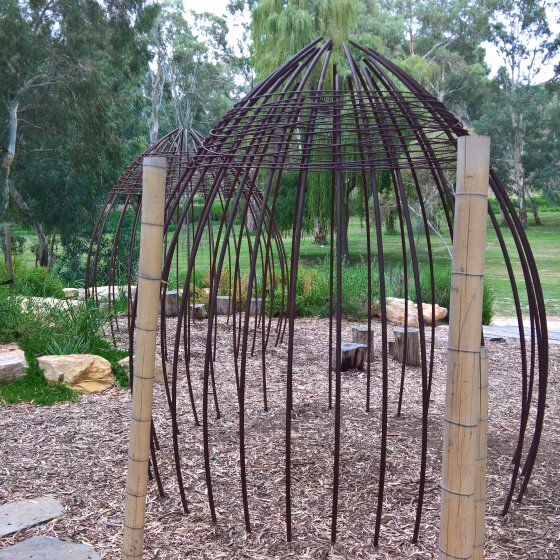- Home
- Health of Country
- Importance of Healthy Country
Importance of Healthy Country
This SOER commissioned an expert report on the how we can more effectively engage and actively involve First Nations Peoples in monitoring, reporting on and caring for Country and what benefits this would achieve.
Expert Paper: Towards Healthy Country
The SOER also provides a recommendation on what the South Australian Government needs to do to help bring First Nations values, knowledge and expertise into the state’s efforts to protect, restore and report on the health of the environment.
Australia is home to the oldest continuing living culture in the entire world with Aboriginal and Torres Strait Islander people caring for Country for at least 65,000 years. Being the oldest continuing culture in the world means Aboriginal people have a unique perspective on the integrated relationship between humans and the natural environment, and the importance and influence that the environment has on human health and wellbeing. Learning, understanding, and embedding Aboriginal knowledge in future protection and restoration of Country is an important element of South Australia’s reconciliation journey.
Aboriginal peoples have a deep connection to Country and consider that if Country is healthy, they are healthy. Health of Country is central to Aboriginal culture. Aboriginal cultures have their own stories, songs and dances, which is how knowledge and information about health of Country is passed down through generations. Caring for Country and healing Country is fundamental to culture and wellbeing.
The theme for NAIDOC week in 2021 was ‘Heal Country’, which highlights the importance to Aboriginal peoples of a healthy Country.
Country is inherent to our identity.
It sustains our lives in every aspect – spiritually, physically, emotionally, socially, and culturally.
It is more than a place.
When we talk about Country it is spoken of like a person.
Country is family, kin, law, lore, ceremony, traditions, and language. For Aboriginal and Torres Strait Islander peoples it has been this way since the dawn of time.
Through our languages and songs, we speak to Country; through our ceremonies and traditions we sing to – and celebrate Country – and Country speak to us.
Increasingly, we worry about Country.
For generations Aboriginal and Torres Strait Islander people have been calling for stronger measures to recognise, protect, and maintain all aspects of our culture and heritage for all Australians.
We have continued to seek greater protections for our lands, our waters, our sacred sites and our cultural heritage from exploitation, desecration, and destruction.
We are still waiting for those robust protections.
Healing Country means hearing those pleas to provide greater management, involvement, and empowerment by Indigenous peoples over country.
Healing Country means embracing First Nation’s cultural knowledge and understanding of Country as part of Australia's national heritage. That the culture and values of Aboriginal peoples and Torres Strait Islanders are respected equally to and the cultures and values of all Australians.
The right to protect Country and culture is fundamental.
Destruction and desecration of our sacred lands or ancient sites - some of the oldest human occupation sites on the planet – is an enormous loss for both our nation and the world.
But to truly heal Country we have more to do.
Our lands will continue to burn from bushfires, droughts will continue to destroy our livelihoods, without using traditional practices that have protected this country for centuries.
For generations, our Elders and communities have advocated, marched and fought for substantive institutional, structural and collaborative reform.
The aspirations of Aboriginal and Torres Strait Islander peoples are the culmination of generations of consultation and discussions among our nations on a range of issues and grievances.
Healing Country means finally resolving many of the outstanding injustices which impact on the lives of our people.
It must be a fair and equitable resolution.
Fundamental grievances will not vanish. In the European settlement of Australia, there were no treaties, no formal settlements, no compacts. Aboriginal and Torres Strait Islander people therefore did not cede sovereignty to our land. It was taken from us. That will remain a continuing source of dispute.
To Heal Country, we must properly work towards redressing historical injustice.
While we can’t change history, through telling the truth about our nation’s past we certainly can change the way history is viewed.
After 250 years, our children and our future generations deserve better.
For generations we have repeatedly called for just recognition of our right to participate on an equal basis in economic and social terms.
Yet such participation cannot be successful unless, first, there is formal recognition that Indigenous people have been dispossessed and, second, definite, specific steps are taken to redress the grave social and economic disadvantage that followed that dispossession.
Healing Country is more than changing a word in our national anthem – it is about the historical, political, and administrative landscapes adapting to successfully empower and celebrate Aboriginal and Torres Strait Islander communities, nations, and heritage.
We are all looking for significant and lasting change.
We cannot afford to let pass the very real opportunity that now presents itself for reform based on a fundamental change in the relationship Australia has with Aboriginal and Torres Strait Islander peoples.
© Commonwealth of Australia 2020
NAIDOC Week is an Australian observance lasting from the first Sunday in July until the following Sunday. The acronym NAIDOC stands for National Aborigines' and Islanders' Day Observance Committee. NAIDOC Week has its roots in the 1938 Day of Mourning, becoming a week-long event in 1975 (Wikipedia)
Further Reading
- Educational resources for schools relating to Heal Country NAIDOC week in 2021
Banner Photo: Traditional Aboriginal fish trap sculpture at Flexistow Reserve
